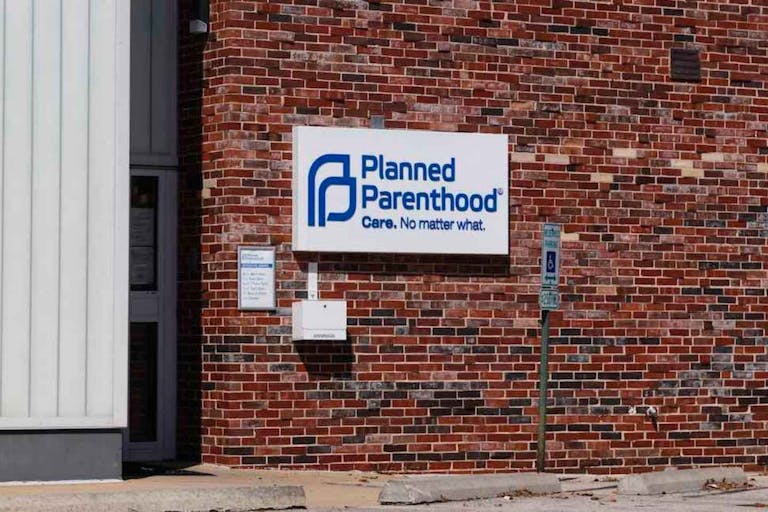
Woman intentionally hit pro-life activist with her SUV at Planned Parenthood
Cassy Cooke
·
Shortsighted report suggests killing future generations is a great money-saving idea
A new report claims pro-life state laws protecting preborn children from abortion cost the U.S. economy billions of dollars — essentially making the argument that it’s acceptable to kill human beings if it might save money.
In 2022, Roe v. Wade was overturned, allowing individual states to enact laws protecting preborn children from abortion.
The Institute for Women’s Policy Research (IWPR), a think tank based in Washington, D.C., claimed the fall of Roe has led to hundreds of billions of dollars in economic losses.
Women do not need to sacrifice their children to achieve economic stability.
If human lives can be sacrificed for the economy, there is virtually no limit to how many lives could be taken.
According to the IWPR analysis, the group claimed that 16 pro-life states have cost the U.S. economy $64 billion each year since Roe was overturned. The analysis further added that if more states were included — states with any restrictions on abortion, even if it is legal in some instances — the economic cost rises to over $133 billion.
One example of the reasoning used was that pro-life laws prevent women from entering the workforce (read: they might choose to stay home to raise their children instead) — and that with legal, unlimited abortion, there would be over 500,000 more women working each year. Additionally, the analysis alleges women would earn more money if abortion was completely legal.
“Restoring and expanding access to abortion is not just about protecting reproductive rights and women’s access to essential health care,” Dr. Melissa Mahoney wrote in a blog post announcing the analysis. “It’s about advancing economic and racial justice — and building a stronger, more resilient, and more inclusive economy for women and their families.”
These claims have been made before, by IWPR and other pro-abortion organizations, numerous times. Yet what is rarely mentioned is how — if women are prevented from being part of the workforce due to motherhood — abortion specifically plays a part in this.
Companies like Walmart, Google, Nike, UPS, and Planned Parenthood have been accused of firing women who become pregnant, while pregnant women in the military have testified to being pressured to abort their children or lose their jobs. Politicians, pharmaeceutical companies, car dealerships, and countless others have attempted to force pregnant women into abortions, under threat of job loss. This is illegal in the United States. Yet it’s still happening.
What women need isn’t abortions; it’s to have a workforce system in place where motherhood is treated as vital and respected, and where women aren’t forced to choose between their children and their livelihoods. Parents must be afforded flexibility. A society that puts profits over people has lost its way when it comes to what is most important.
Dr. Michael New responded to the report in a statement sent to Live Action News:
A recent analysis published by the Institute for Women’s Policy Research claims that recently enacted pro-life laws have cost the U.S. economy $64 billion. However, this analysis is based on exceptionally weak research. It assumes that strong pro-life laws will result in lower labor force participation among women — and hence lower economic productivity. However, it fails to analyze any hard data on actual labor force participation among women in state with strong pro-life laws.
Article continues below
Dear Reader,
Have you ever wanted to share the miracle of human development with little ones? Live Action is proud to present the "Baby Olivia" board book, which presents the content of Live Action's "Baby Olivia" fetal development video in a fun, new format. It's perfect for helping little minds understand the complex and beautiful process of human development in the womb.
Receive our brand new Baby Olivia board book when you give a one-time gift of $30 or more (or begin a new monthly gift of $15 or more).
There are numerous other flaws and weaknesses with this analysis as well. The study claims that pro-life laws are hurting economic growth in all states — even states like California and Massachusetts which have not passed any kind of pro-life laws since the Dobbs decision. It also fails to account for the fact that multiple studies have shown that recently enacted pro-life laws have resulted in statistically significant birth rate increases. In the long term, children will grow up and contribute positively to the economy.
Data from the U.S. Census Bureau clearly shows that in 2024, 13 of the 16 states with strong pro-life laws on the books saw population increases in 2024. Furthermore, many states with permissive policies on abortion including California, Maryland, Massachusetts, New Jersey and Illinois all lost population. People move for many reasons. However, on balance people are more likely to move to states with strong economies and move away from states whose economies are weak. Overall, there is no evidence that the strong pro-life laws passed after the Dobbs decision have hurt economic growth.
Across the globe, birth rates have been plummeting — so much so, that even the United Nations Population Fund has been forced to acknowledge there is a real problem. And this has more of an effect than just reducing a country’s citizens; it directly affects the economy, and not in a good way. As population collapses, the workforce shrinks while the number of retirees grows, which then leads to a strain on social security systems in place.
Yet pro-abortion organizations like IWPR and the UNFPA continue to support and promote abortion as not only a human right, but as a force for economic good — a short-sighted and counter-productive mindset that has nothing to do with what is good for the economy and everything to do with what is good for the abortion agenda.
IWPR has also not acknowledged what else could happen if its argument were followed to its logical conclusion.
If human beings’ lives are only valuable based on their ability to grow the U.S. economy, then how many “non-contributing” lives can be taken?
We see that this is already happening with the legalization of assisted suicide, when people who are considered to be too old, too sick, too disabled, or too poor all become disposable.
Lives do not have value based on how much money they can make or what they can contribute to a nation’s economy, and this utilitarian idea is disturbing and offensive to the extreme.
Live Action News is pro-life news and commentary from a pro-life perspective.
Contact editor@liveaction.org for questions, corrections, or if you are seeking permission to reprint any Live Action News content.
Guest Articles: To submit a guest article to Live Action News, email editor@liveaction.org with an attached Word document of 800-1000 words. Please also attach any photos relevant to your submission if applicable. If your submission is accepted for publication, you will be notified within three weeks. Guest articles are not compensated (see our Open License Agreement). Thank you for your interest in Live Action News!

Cassy Cooke
·
Analysis
Cassy Cooke
·
Politics
Madison Evans
·
Opinion
Nancy Flanders
·
Investigative
Carole Novielli
·
International
Cassy Cooke
·
Analysis
Cassy Cooke
·
International
Cassy Cooke
·
International
Cassy Cooke
·
Politics
Cassy Cooke
·
Pop Culture
Cassy Cooke
·